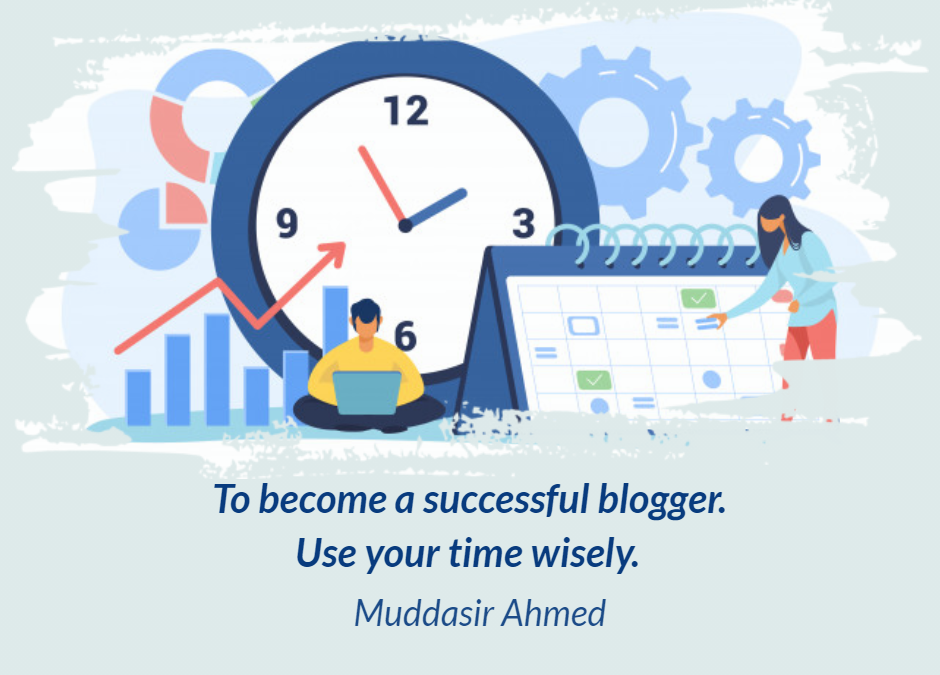
by Mudassir Ahmed | Blogging |
 This is a guest post contribution by Muddasir Ahmed. Mudassir is the founder of his blog at BloggingExplained.com. He has already helped dozens new bloggers get started blogging. His step by step guide to starting a blog is a must have for every new blogger. In this post, Mudassir shares helpful time saving blogging tips
This is a guest post contribution by Muddasir Ahmed. Mudassir is the founder of his blog at BloggingExplained.com. He has already helped dozens new bloggers get started blogging. His step by step guide to starting a blog is a must have for every new blogger. In this post, Mudassir shares helpful time saving blogging tips
Every single day, there have been aspirers attempting to start a blog, hoping to become a hustler. However, most of them might quit after a few days, weeks or months because of being unable to see the traffic and money.
Time’s changing; if you think you can make passive income from a blog by initially publishing a few posts, running ads and placing banners, then you’re wrong. You can’t expect overnight traffic spikes or hundreds of loyal followers despite never being consistent in publishing and falling in love with the process.
In this blog post, you will learn about 3 C’s that every new blogger must highly focus on in order to become a successful blogger. Let’s start!
1. Create
Creating content should be your core strategy to build a successful blog. Without high-quality content, no matter what you do on your blog won’t help.
A blog with no clear goal or no helpful content to offer to its audience would be marked as ‘thin’, while a blog with consistent content production on a specific category will surely make its presence in the blogosphere.
Don’t try to attract multiple groups of audience with one blog, most bloggers fail for this reason. You may be a jack of trades but the modern audience prefers a specialist who is a master at a single niche. Understand this easy logic to divert yourself from the crowd of struggling bloggers.
Know your audience, understand their intent behind search query or visiting your blog and fulfill it; write a 500-word article or a meaty 3000-word SEO optimized one; it must help your readers. Along the way, you may want to consider tools like Grammarly to create winning content.
Also it is equally important to update your old blog posts frequently to give your readers the accurate information and build trust over time.
2. Connect
Connections are really important to grow in blogging. They tend to get you the guest post opportunity on even top publications like Forbes, Entrepreneur, or bigger and introduce you to tons of new readers. The more you build connections, the easier the blogging journey becomes. You never know who can change your blogging life for the better.
You maybe are holding yourself back from connecting with bloggers because you feel fear and inferiority in your head.
I’ve so been there.
Here’s the deal:
Shortcuts often fail. Don’t reach out to an unknown blogger for collaboration in the very first attempt. High chances are that you get a response with a link to their “advertise” page or don’t get at all. There’s a little success ratio in this way.
SO first connect with niche-relevant or like-minded bloggers on Twitter or Facebook, engage and share their content, mention in your content, or even buy their eBooks/courses consistently. Promote them without expecting anything in return.
Your efforts don’t go in vain; sooner or later they will start recognizing you and might pay interest for possible collaboration. That’s the modern social strategy you need to adapt to befriend bloggers.
3. Commitment
Commit yourself to:
- spending tons of hours to learn skills like researching, writing
- building social connections
- working on blog’s SEO
- helping your fellow blogging buddies
- contributing to the community
Committing to your goals definitely helps you thrive. So surround yourself with pro bloggers and people who are willing to grow.
I can’t stress enough how crucial the 3 C’s are to become successful in the blogging industry. By all means, I don’t ask you to focus on these elements at once; going one at a time could also drive better results. Most importantly; you need to enjoy the process more than anything.
It is now up to you to keep the pace, do well and join the pro benchmark.
I hope this content has found you great! Do you have any points? I’d love to hear in the comments.

by Mudassir Ahmed | Blogging |
 This is a guest post contribution by Muddasir Ahmed. Mudassir is the founder of his blog at BloggingExplained.com. He has already helped dozens new bloggers get started blogging. His step by step guide to starting a blog is a must have for every new blogger. In this post, Mudassir shares helpful time saving blogging tips.
This is a guest post contribution by Muddasir Ahmed. Mudassir is the founder of his blog at BloggingExplained.com. He has already helped dozens new bloggers get started blogging. His step by step guide to starting a blog is a must have for every new blogger. In this post, Mudassir shares helpful time saving blogging tips.
Are you finding it difficult to drive better results even though you spend more time blogging?
Maybe you’re draining attention in activities that are absolute of no use in growing your blog and turn a blind eye to important ones. It is required for you to know your priorities in blogging and work through them over time.
In order to become a successful blogger, you must learn to use your time wisely on productive things and cut loose the less-important ones. Hopefully, in this article, you will find some useful tips regarding this aspect.
Let’s start.
#1. Getting obsessed with keyword strategy
Keywords are crucial and they make you rank on search engines. True that!
But don’t let the keyword research tools eat your big time to generate so-called money-making keywords. Spending so much time on keyword strategy could only tempt you to use various keyword variations and eventually make your content spammy and low valued.
Instead, focus on crafting information-rich content that matches the human intent and not to manipulate algorithms. Let your keyword placement be natural along with the content flow.
#2. Spending creating long-form content
Long-form content does rank as it covers the topic in-depth and undoubtedly this fact is driving the new bloggers crazy. Most of them are filling their blog post with bloat, unnecessary words and sub-topics just for the sake of word-length. Such a practice not only hurts blog SEO but also the reader’s trust.
So don’t fall for the myths like “Long-form content is better than short-form.” No matter how long you take to create a 10k+ word guide, if the content is not answering the user’s main intent, then you’ve wasted time creating it and going to waste time changing it.
Knowing your user’s search intent will help you understand the ideal word-length for your content and help you deliver the value. For example, if someone searches “how to create a blog on WordPress,” that’s what they’re doing to be looking for – an answer for that specific question, not creating a blog on wix or blogspot as well.
 #3. Designing your blog
#3. Designing your blog
There’d be an excitement for newbies to develop their blog design appealing. They spend lots of time making their blog good-looking by trying various themes, customizing blog layouts, adjusting font styles, logo designs and so on.
Frankly, your theme and blog layout is not going to make much difference while you’re new to blogging and have a little or null content on your blog. Having over-concerned about your blog design is going to kill you a lot of time.
As you grow as a blogger, you will not be surprised to learn why the popular bloggers and marketers prefer extremely simple blog layout over a shiny one. As you develop more engaging content and tribe, you will have better way to organize your content and then can start working on the design and branding part. Until then, just go with free versions from themes like Astra, Generate Press, or schema lite, etc.
#4. Improving your blog numbers
Jumping into your analytics dashboard is a good practice and I’m not denying that. As a matter of fact, analyzing blog stats helps you understand your performance.
But what good it is if you keep checking the stats for every hour? Does your frustration help directly or indirectly in improving your blog’s domain authority overnight or in a day?
I’m sure the answer is NO!
Blogging is just like sowing a seed today and waiting patiently months or years to watch it growing and yielding.
Moz is not going to reward you with the big D.A number like 60 or Google is not going to hand you over 50,000+ visits per month just like that. It takes a lot of time and effort to earn such milestones. So don’t be curious about numbers and waste your time by checking them frequently. Shift your focus from growing numbers to adding value around and you shall see the better numbers gradually.
#5. Covering multiple niches
Blogging various topics on one blog wastes your time and energy because you don’t make the connection with any audience at all.
Imagine a finance blogger all-a-sudden started publishing content about losing bodyweight, bitcoin mining, or even about a web series review. He fails to connect with the core audience that he made via finance content.
As my friend, Ryan Biddulph says, covering specific niche content gradually makes you a specialist and people prefer to listen to specialists when they need a solution but not to generalists.
Get clarity and target only a specific audience base instead of all.
 #6. Running behind blog monetization
#6. Running behind blog monetization
Making money via your blog requires strategic planning. Here’s the blueprint – you need to create helpful content, engage with your audience, earn their trust, and then start monetizing your blog.
Don’t try to lure your audience to click your ads or affiliate links without offering value to them.
I feel so real when pros say how they patiently worked years on adding value in order to generate a regular income stream. That’s true, good things take time.
If you skip this advice and jump into monetizing your blog, I’m sure you will have a hard-luck watching the money falling into your pockets and end up frustrated wasting your time and efforts.
#7. Jumping to building OFF-page SEO
I don’t deny the fact that off-page strategies like link building will take your blog’s digital presence to the next level.
Think of all the hours that you spend building links to your blog. Whether they’re from authority sites or PBN’s, they’re not going to benefit you unless you have the quality content that supports those links.
I see how newbies are getting obsessed with building backlinks for their blogs without having a decent topical authority in their niche. Believe me, this is no help.
First, get your on-page SEO in order before you move to an off-page strategy.
Conclusion
The only reason I came up with this topic is to help beginners prioritize the right THINGS in order to be rewarding. Learning the right things at the right time will earn you a lot of time and opportunities to become successful.
Connect with pros, learn how they’ve been blogging these many years, and opened multiple income sources.
I hope you’ve enjoyed reading it.

 This is a guest post contribution by Muddasir Ahmed. Mudassir is the founder of his blog at BloggingExplained.com. He has already helped dozens new bloggers get started blogging. His step by step guide to starting a blog is a must have for every new blogger. In this post, Mudassir shares helpful time saving blogging tips
This is a guest post contribution by Muddasir Ahmed. Mudassir is the founder of his blog at BloggingExplained.com. He has already helped dozens new bloggers get started blogging. His step by step guide to starting a blog is a must have for every new blogger. In this post, Mudassir shares helpful time saving blogging tips


